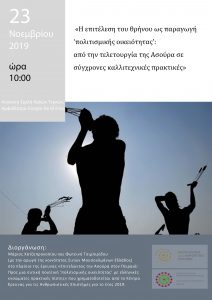TRANSCA is a European initiative/Erasmus+ project that champions the integration of social anthropology into education to address pressing societal concerns, such as diversity, immigration, and socio-economic disparities. The project’s primary goals encompass bridging teacher education with socio-cultural anthropology, instilling key anthropological insights into teacher education, and innovatively addressing the complexities of classroom diversity. Essential to TRANSCA is introducing reflexive anthropological methods, enhancing educators’ understanding of their students’ lived experiences. Collaborating with prominent institutions across Greece, Denmark, Austria, and Croatia, TRANSCA emphasizes partnerships with Teacher Colleges and related associations. Key deliverables include a “Whitebook” of best practices, a concept manual, and a suite of teaching resources, all hosted on a sustainable digital platform. Ultimately, TRANSCA aspires to augment social inclusion in European education, propelling social cohesion across the continent.
See the project’s webpage and final deliverables: https://transca.net/en/index
 admin
admin
Performing Ashura in Piraeus: Towards a Shiite poetics of ‘cultural intimacy’ with Greek embodied practices of religiosity
The research examines the ritual of Ashura, as it is performed by the Pakistani Shia community in Piraeus. Ashura is the day of mourning for the martyrdom of Imam Husayn: the Prophet’s grandson and 3rd Imam who led a revolt against the Omayyad caliph Yazid A, and was finally beheaded in the battle of Karbala in 680 AD. This battle provides the central narrative around which Shia Muslims construct their political identity as migrants and their religious identification as a minority vis-à-vis Sunni Muslims in Greece. Ashura is commemorated every year through rituals of lamentation and public processions that include, in some cases, self-flagellation.
A decontextualized focus on the act of self-flagellation, over-accentuated by the mass media, reinforces local stereotypes of the Shia community practices as ‘incompatible’ with Greek cultural values. Social representations of the Shiite as ‘barbaric Others’ are frequently evoked in public debate in order to support Islamophobic and racialised narratives of anti-cosmopolitanism. However, confronted with xenophobia and social estrangement, the Shiite systematically attempt to articulate counter-narratives of ‘cultural intimacy’ (Herzfeld 2005) that stress the similarities between their ritual lament and various embodied performances of faith from the Greek cultural context, such as the Tinos pilgrimage (Dubisch 1996) or the Anastenaria (Danforth 1989).
The proposed research has a threefold purpose. First, it documents the community’s political struggle to promote discursively and practically a multicultural vision of citizenship based on embodied and affective components of subjectivity. Second, it unravels the rich meta-symbolic character the Ashura assumes in a migratory context, becoming an idiom or expressing and negotiating feelings of loss associated with migration trajectories. Third, departing from the case of the Ashura, but also opening-up the research focus through other examples of performances of lament, it examines how the claim to cultural intimacy is re-articulated in contemporary artistic practices, focusing on the performing arts.
More informations: https://www.rchumanities.gr/en/omada-chatziprokopiou-tsibiridou/
The Status and the Image of non-Europeans in European Societies.
Thursday, December 5th at the University of Macedonia from 16:00 to 22:00 (16.00, AUDITORIUM 14 and 20.00. AUDITORIUM 3).
For further information please visit the facebook event page:
https://www.facebook.com/events/734641837037832/ or https://www.uom.gr/7360-syzhthsh-stroggylhs-trapezhs-me-thema-to-kathestos-kai-h-eikona-ton-mh-eyropaion-stis-eyropaikes-koinonies
Meeting – mutual exchange of ideas
On November 29th , the Lab will host a presentation for the Center for Balkan Cooperation LOJA (Tetovo, North Macedonia) and the NGO “KURVE Wustrow – Centre for Training and Networking in Nonviolent Action” (Wustrow, Germany) regarding their – project “Anchoring Multi-ethnic Youth Work in University Curricula for Future Teacher” within the frame of Civil Peace Service (Ziviler Friedensdienst). The meeting has as an objective the mutual exchange of ideas on issues of interculturalism and education.
Performing Ashura in Piraeus: Towards a Shiite poetics of ‘cultural intimacy’ with Greek embodied practices of religiosity”, Symposium
Chatziprokopiou Marios, Tsibiridou Fotini https://www.rchumanities.gr/en/omada-chatziprokopiou-tsibiridou/
Symposium
“The performance of lament as production of ‘cultural intimacy’: from the ritual of Ashura to contemporary artistic practices”.
Athens School of Fine Arts, Giorgio DeChirico Auditorium
Saturday, November 23rd 2019
The research project “Performing Ashura in Piraeus: Towards a Shiite poetics of ‘cultural intimacy’ with Greek embodied practices of religiosity” was funded by RCH for the year 2019. Co-organization with Cultures Borders Gender Laboratory https://cbg-lab.uom.gr/en/

